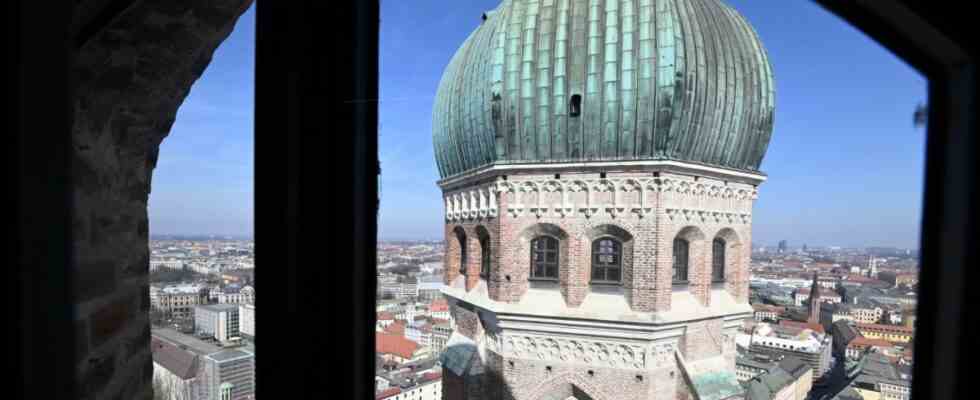The Catholic Church is running away in droves – and not just since the publication of the Munich abuse report in January. The economic consequences of the pandemic and the Ukraine war are also leaving their mark. And yet: Contrary to all expectations, the Archdiocese of Munich and Freising generated a surplus in the 2021 budget year. Instead of the initially feared twelve million euros of misery, the bottom line is now 17 million euros on the credit side.
At the presentation of the annual report on Thursday, however, that was no reason for arrogance for Stephanie Herrmann, head of the archbishop’s ordinariate: “Even if the income in the past year has not yet fallen to the extent that we expected, we must and want to deal with the changed social and economic framework conditions, which are clearly perceptible.”
Stephanie Herrmann, Head of Office of the Archdiocese of Munich and Freising, speaks at the press conference to present the 2021 annual financial statements and the 2022 budget.
(Photo: Angelika Warmuth/dpa)
The surprise also for the Archbishop’s Finance Director Markus Reif: Despite the high number of exits, the income from the church tax of 647 million euros in 2021 is almost as high as in the year before. Why is that? “You can’t really explain that,” says Reif. Most likely with the fact that many people here “obviously made good money”. The church tax is linked to the amount of wage and income tax. Traditionally, this revenue item is the mainstay of the diocesan budget.
Overall, the archdiocese received 884 million euros last year (2020: 864 million). 130 million of this comes from public subsidies, 63 million alone is transferred by the state for the operation of church schools, 13 million for religious instruction in state schools. This spring is also unlikely to continue bubbling constantly. “Of course we are ready for replacements,” says Reif, referring to the traffic light coalition’s plans to create new framework conditions for this financial transfer before the end of this legislative period.
Archbishop Finance Director Markus Reif.
(Photo: Angelika Warmuth/dpa)
The biggest chunk of the archdiocese’s expenses in 2021 is the staff. Of a total of 871 million euros in costs, 335 million were attributable to employees (2020: almost 342 million). “Pastoral care and education,” explains Reif, “are personnel-intensive areas.” So far, however, there has been no staff reduction program to save money, according to Head of Office Herrmann. However, a commission is examining which vacancies actually have to be filled again.
The balance sheet total at the end of 2021 was around 3.75 billion euros, 30 million more than in the previous year. The assets of the archdiocese, one of the richest in the country, include fixed assets worth 1.47 billion euros. The lion’s share, at 1.1 billion euros, is accounted for by plots of land, both developed and undeveloped. The church also has financial assets, but these have fallen by a good 50 million euros to 1.39 billion.
Even if last year went surprisingly well, the outlook for the current 2022 budget bears different signs: “There is clearly a negative development here,” says Reif. A loss of 32 million euros is expected. It is calculated with around 25 million euros less income from church tax and higher costs due to inflation. Herrmann also refers to “massive cost increases in building maintenance”. In 2022, a lot of money will flow into the redesign of the diocesan museum on Domberg in Freising (9.1 million), the new construction of the Franziskus elementary school in Haidhausen (7.6 million) and the construction of a new apartment building on Hiltenspergerstrasse in Munich (6.3 million). .
The archdiocese wants to get the increasingly tense financial situation under control through an “overall strategy process” and, in case of doubt, also cancel certain church offers. It is not yet clear which ones these are, says Herrmann. The waiver of real estate – about 7,000 are owned by the archdiocese – is in the room. What these are is still being investigated. In any case, one is open to the conversion of sacred buildings.

